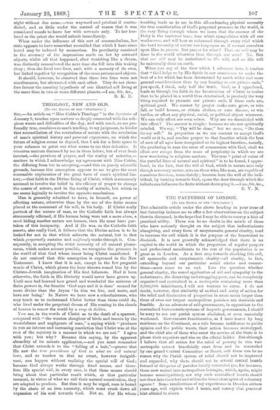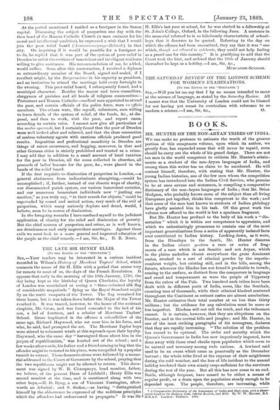THE PAUPERISM OF LONDON. [To THE EDITOR OF THE "SPECTATOR. "]
TFIR admirable article under the above heading in your issue of last Saturday induces me to offer a few observations on the subject therein discussed, in the hope that I may be able to convey a hint of practical utility. There can be no doubt in the minds of those who have seriously thought on the subject that indiscriminate
almsgiving, and every form of unsystematic general charity, tend to increase the evil which it is the purpose of the benevolent to diminish. It is now generally acknowledged that there is no capital in the world in which the proportion of regular paupers and professional mendicants to the rest of the population is so great as in London. As a first step towards checking this evil, all spasmodic and unsystematic charity—all charity, in fact, extending beyond our particular social circles and connections—must come to an end. Into the question whether general charity, the sound application of aid and sympathy to the unfortunate, the deserving and struggling poor, can be completely organized and centralized in a metropolis containing more than 3,000,000 inhabitants, I will not Teuture to enter. I do not doubt, however, that similarity of method and unity of action for the relief and diminution of pauperism in areas much larger than those of even our largest metropolitan parishes are desirable and feasible. As an advocate of self-government, in opposition to the centralized bureaucratic systems of despotic governments, I should be sorry to see our parish system abolished, or even materially weakened. Government functionaries, as I have learnt by long residence on the Continent, as a rule become indifferent to public opinion and the public wants, their action becomes stereotyped, and the chief aim of those who enter the service of the State is to please their superiors and rise on the official ladder. But although I believe that all action for the relief of poverty iu this vast metropolis cannot beneficially start from and be controlled by one grand Central Committee or Board, still there can be no reason why the Parish system of relief should not be improved and expanded, why there should not be several central boards formed of delegates of parishes locally connected (as, for instance, those now united into metropolitan boroughs, which, again, might become municipalities), nor why such centralized boards should not draw into their foci and utilize the benevolent spirit of voluntary agents ? Some recollections of my experiences in Dresden sixteen years ago, will explain what I mean, and convey that practical hint alluded to above. At the period mentioned I resided as a foreigner in the Saxon capital. Discussing the subject of pauperism one day with the then head of the Roman Catholic Church (a man eminent for his moral and intellectual qualities), he expressed a wish that I would join the poor relief board (Armenversorgungs-BehOrde) in that city. On inquiring if it would be possible for a foreigner so to do, he replied that it was part of the system of poor-relief in Dresden to enlist the services of benevolent and intelligent residents willing to give assistance. His recommendation of me, he added, would suffice. Soon after this conversation, I received a diploma as extraordinary member of the Board, signed and sealed, if I recollect aright, by the Biirgernzeister in his capacity as president, and an invitation to attend the meetings held every fortnight in the evening. This poor-relief board, I subsequently found, had a municipal character. Besides the mayor and town councillors, clergymen of parishes and all heads of religious communities— Protestant and Roman Catholic—medical men appointed to attend the poor, and certain officials of the police force, were ex officio members. The others were, like myself, volunteers, men willing to learn details of the system of relief, of the funds, &c., at disposal, and then to work, visit the poor, and report cases, according to certain rules. I cannot now give all particulars of the modes operandi, but I certainly found that the poor of Dresden were well looked after and relieved, and that the close connection of zealous voluntary agents with cautious officials produced good results. Imposition and professional mendicity in Dresden are things of rarest occurrence, and begging, moreover, in that and other German cities is strictly prohibited and treated as a crime. I may add that in addition to a small amount of local taxation for the poor in Dresden, all the sums collected in churches, all proceeds of ladies' bazaars for the poor, &c., were placed in the hands of the relief board.
If the first requisite to diminution of pauperism in London,—a general abstinence from indiscriminate almsgiving,—could be accomplished ; if, further, instead of our chaotic ways of charity, our disconnected parish system, our various benevolent societies, and our numerous benevolent individuals now " jostling one another," as you truly say, " in their search for objects," could be superseded by sound and united action, very much of the evil of pauperism, which many seriously deplore and dread, would, I believe, soon be in course of diminution.
In the foregoing remarks I have confined myself to the judicious application of charity for the relief and diminution of poverty. But the chief sources of pauperism and crime, as is well known, are drunkenness and early improvident marriages. Against these evils we must look to a more general and improved education of the people as the chief remedy.—I am, Sir, &c., It. It. NOEL.



































 Previous page
Previous page